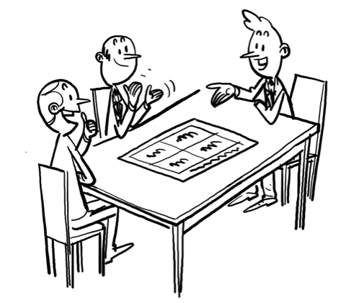 Of course your customers trust you. Don’t they? Trust is the single most important part of the relationship between a Sales Person and the customer. Take this test and see if you still think they really trust you.
Of course your customers trust you. Don’t they? Trust is the single most important part of the relationship between a Sales Person and the customer. Take this test and see if you still think they really trust you.
-
Do you get a lot of leads from customer referrals?
-
Do the people you encounter in the sales process always introduce you to the real decision-makers?
-
Do customers perceive you as a thought leader?
-
Do customers say that you are good at helping them define what they really need?
-
Do customers use your presentations to communicate internally with decision-makers?
-
Are your value propositions tailored to the goals and decision criteria of the different roles in the Buying Centre?
-
Do customers open up and talk to you about their personal interests?
-
Do you bring the best people to work on an opportunity and do they come across as a well-coordinated team?
-
Does the hand-over of information from sales to the delivery team ensure a clear understanding of the value promised?
-
When you ask for feedback after a win do customers say that your sales approach set you apart from the competition?
Let’s go through the questions and your answers and see if your customers really do trust you and what you can do about it if they don’t.
Do you get a lot of leads from customer referrals?
If you do, congratulations, this is a clear indicator that they trust you enough to risk their own reputation by recommending you. Whatever you are doing, keep doing it. If you are not getting enough recommendations it might be that you are just not asking at the right time and in the right way. Take a look at the blog I wrote entitled A Happy Customer is your Best Salesman for guidance.
Do the people you encounter in the sales process always introduce you to the real decision-makers?
If they do, good work. You need those links into the rest of the Buying Centre to get the sales process under control. If not, you need to reflect on the way you prepare and conduct customer meetings, and develop your contacts into Coaches. The blog I wrote entitled Turning a Gatekeeper into a Coach gives you some guidance.
Do customers perceive you as a thought leader?
By creating and distributing content that is helpful, useful and answers the frustrations and challenges your customers have, the probability is much higher that prospects will contact you when they have a concrete need. By providing helpful information to existing customers, you stay on their radar screen and show that you care.
Do customers say that you are good at helping them define what they really need?
If customers are prepared to listen when you suggest they are asking for the wrong thing then they clearly respect and trust you. This requires strong subject matter and industry expertise, as well as consultative skills. If you only respond to what customers say they need, you are not fulfilling an important expectation of vendor salespeople.
Do customers use your presentations to communicate internally with decision-makers?
If they do then you are doing a great job. These days many more people are involved in decision making. And increasingly Procurement is more about internal selling than buying. When the information you provide is used for internal communication, you reach out indirectly to the members of the Buying Centre you cannot get to in person.
Are your value propositions tailored to the goals and decision criteria of the different roles in the Buying Centre?
If your customer has given you access to people in the Buying Centre that shows trust. If you fail to understand the needs and provide good value propositions for all those people you are diminishing that trust and wasting their time. You have to do the work to create those value propositions and ensure that they are experienced.
Do customers open up and talk to you about their personal interests?
People buy from people and the ultimate sign of trust is that the conversation goes beyond business.
Do you bring the best people to work on an opportunity and do they come across as a well-coordinated team?
If you don’t put the best team on the opportunity why are you going after it at all? And imagine this scenario; your contact has arranged for your team to meet some key decision makers. The decision makers start asking questions and your team don’t have the answers. How do you think that makes your contact feel?
Does the hand-over of information from sales to the delivery team ensure a clear understanding of the value promised?
If you have a clear and effective process for handing over from Sales to delivery then you will retain and build on the trust you earned that led the customer to accept your proposal. Keeping in touch during implementation and sorting out any problems that arise will earn trust just at the moment you are likely to ask for a recommendation. As I’ve said often before Happy Customers are repeat customers.
When you ask for feedback after a win do customers say that your sales approach set you apart from the competition?
Done well, asking for feedback shows confidence and allows the customer to open up to you. You want to hear things like “I felt well understood” or “You showed us what makes you different”. You learn important things about the way you sell and strengthen the relationship.
Trust builds sales
If you were able to give a positive answer to all or most of the questions above I am pretty certain that you are making sales. If not, you need to look hard at the way you sell.
We all want to do business with people we trust and trust is earned by Sales People who are first and foremost honest and demonstrate integrity. Other characteristics like responsiveness, talking the customer’s language, knowing their business and your own solution thoroughly and demonstrating your strengths rather than just talking about them all help.
And once customers trust you they don’t just buy from you once, they will buy again and recommend you to other potential customers.
Enjoyed this blogpost? Download our eBook:

